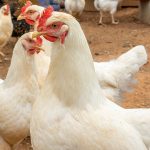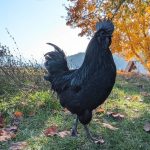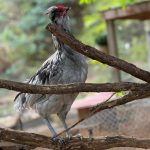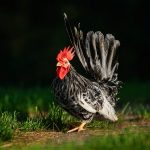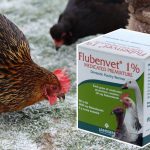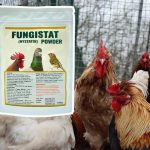Silver Penciled Wyandotte: Breed Profile
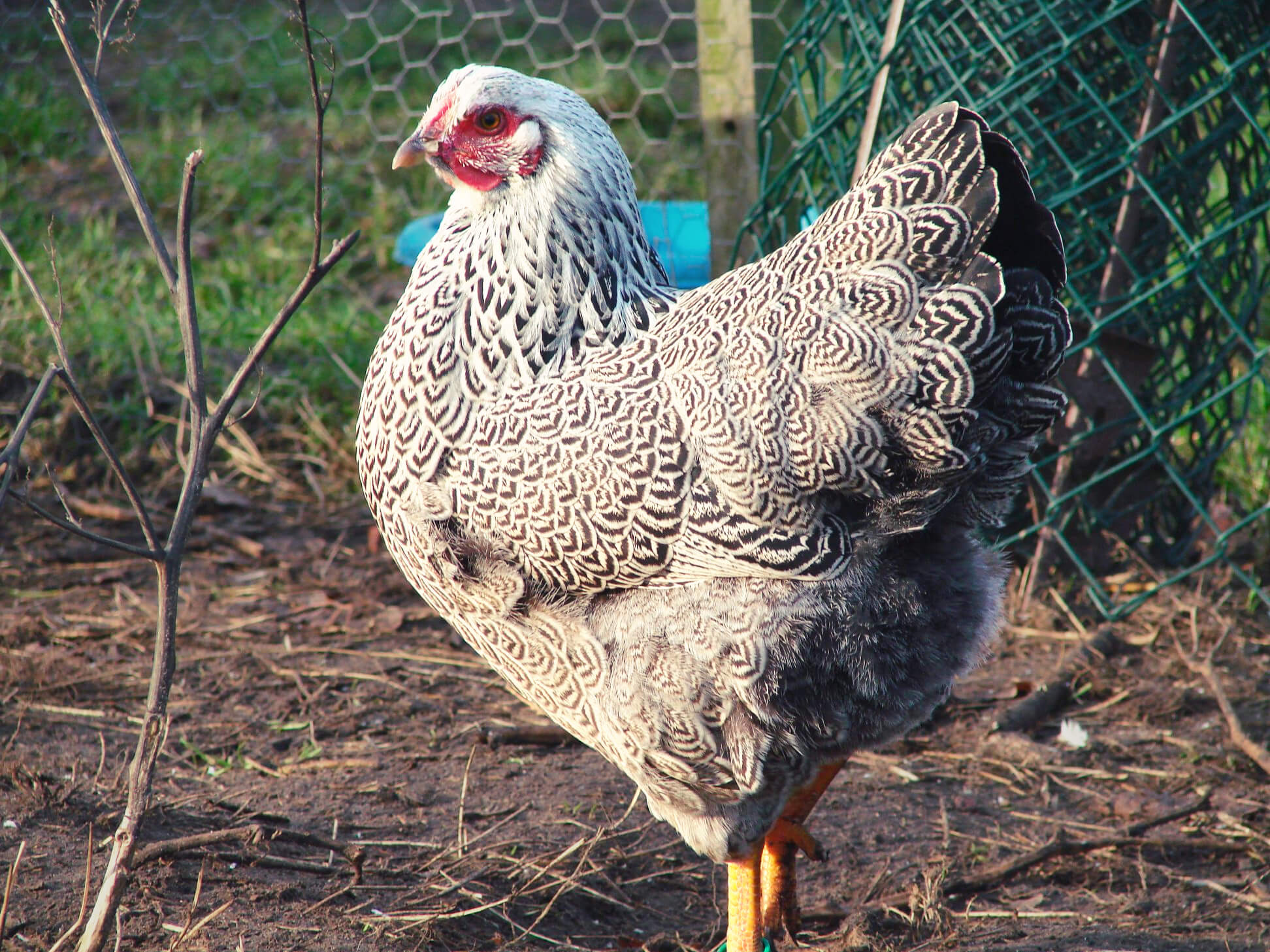
Characteristics | Eggs | Hen vs Rooster | Pros & Cons | Climate | Silver Penciled Color Pattern | History | Genetics | Breeding | Personality
The Silver Penciled Wyandotte is a stunning variety of the Wyandotte chicken that has earned a special place in the hearts of poultry keepers. Originating in the United States, the Silver Penciled Wyandotte has a fascinating history and proves the efforts of passionate poultry breeders.
We’ve collaborated with Wyandotte breeders worldwide and experts from the Dutch Wyandotte Club to compose a full breed profile of the Silver Penciled Wyandotte. This should cover all your questions, whether you are looking for silver-penciled birds in the backyard or breeding purposes.
Characteristics
The Silver Penciled Wyandotte has a striking appearance. Its plumage carries the unmistakable markings of the Partridge Wyandotte, with one notable difference: the base color of the feathers is a crispy white.
The females show a penciled pattern, with fine, parallel lines of black and white that create a captivating design on their feathers. The roosters display plumage reminiscent of wild Jungle Fowl, with a striking contrast of white and black feathers instead of the typical red and black colors seen in many other chicken breeds.
| Eggs | 200 eggs/year |
| Egg Color | Brown |
| Egg Size | Large |
| Weight | 6.5 – 8 lbs |
| Hardiness | Cold Hardy |
| Temperament | Friendly but assertive |
| Beginner-friendly | Yes |
| Color |
Like the other chickens in the Wyandotte chicken family, the Silver Pencilled Wyandottes are rather large and rounded. Roosters tip the scale at 8 pounds (3,6kg), and hens weigh around 6.5 pounds (2,9kg).
They have a red rose comb, and their legs are clean and yellow-skinned. The wattles and earlobes are red. Their beaks are dark golden, complemented by yellow eyes.
In line with the Wyandotte breed’s characteristics, they possess well-developed, plump breasts, making them a superb choice for both meat production and laying capabilities.
Silver Penciled Wyandotte Hen vs Rooster
The Silver Penciled feather pattern is more pronounced in females. The hens exhibit the penciled pattern characterized by fine, parallel lines of black and white on a white base color. This pattern extends across their entire body, creating an impressive appearance.
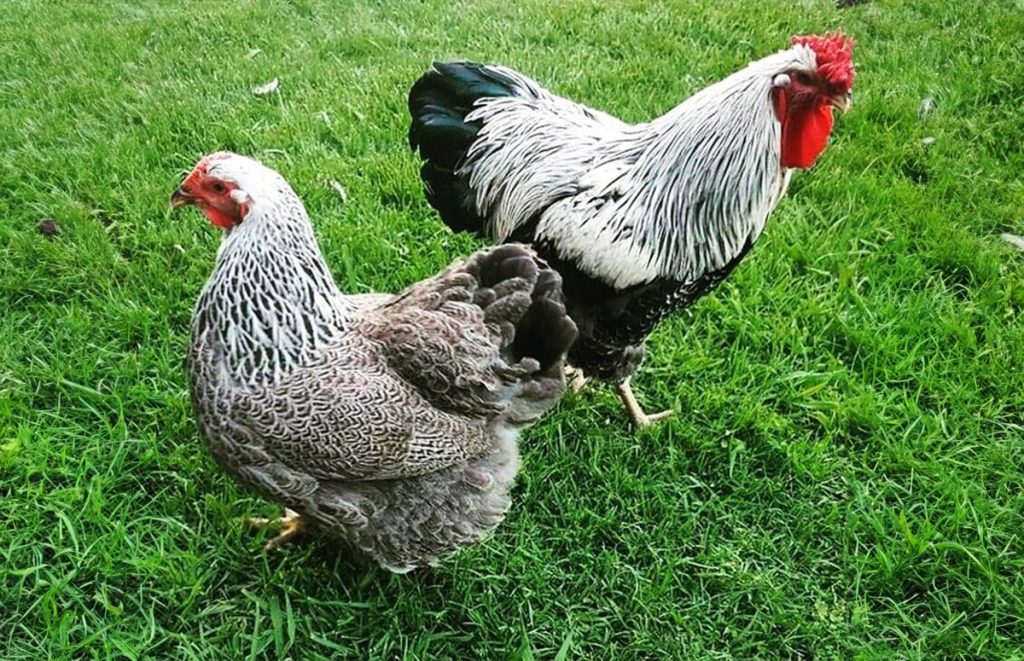
As you can see in the photo above, the roosters of the Silver Penciled Wyandotte breed do not have the same penciled pattern as the hens. Instead, they have white hackles and saddles with some black mixed in and black bodies and tails.
However, the difference between hens and roosters isn’t that obvious after hatching. Young cockerels don’t have a pronounced plumage yet and can look patchy. Pullets usually have a pretty uniform penciled pattern.
| Feature | Silver Penciled Rooster | Silver Penciled Hen |
|---|---|---|
| Weight | 8 lbs | 6.5 lbs |
| Back | Pointed saddle feathers | Rounded feathers |
| Plumage | Plumage resembles wild Jungle Fowl | Intricate penciled pattern |
| Tail Feathers | Long sickles, pointed, no pattern | Patterned, shorter, rounded on the edges |
| Tail Coverts | Black with green luster | Black with white |
| Comb, Wattles | Big, red | Small, pink |
| Body | Large and broad with long legs | Smaller, shorter legs |
Relying solely on the down and plumage to determine gender can be tricky. Some of the chicks are rather yellow, but most of the silver penciled chicks have some black in the down. This is what the down of Silver Penciled Wyandotte chicks looks like just after hatching:
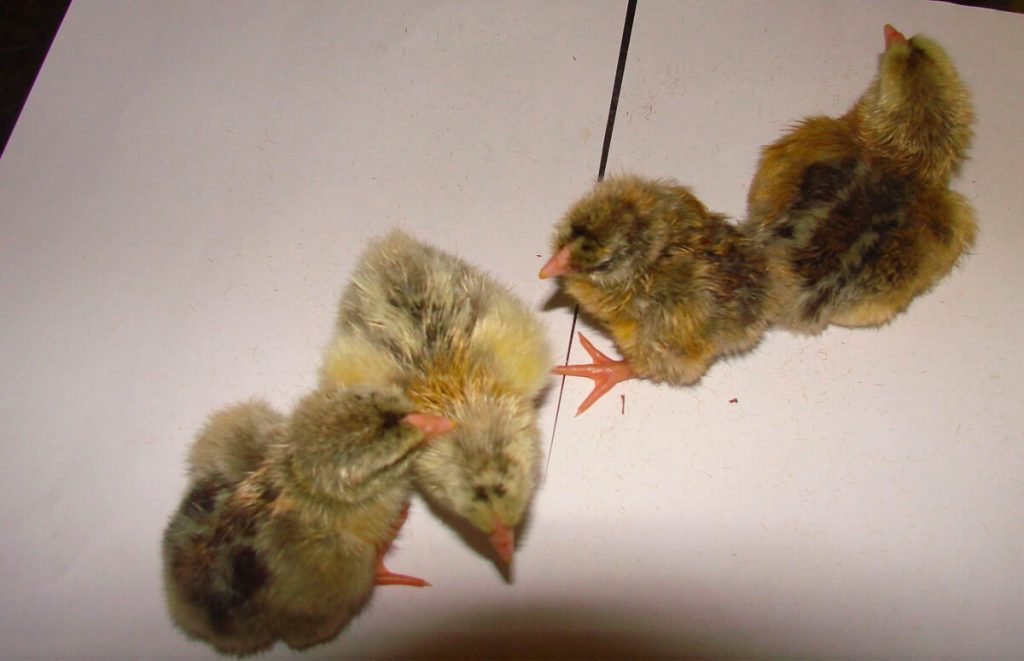
You can distinguish the gender in Silver Penciled Wyandottes definitively by the age of 5 months.
Eggs
The Silver Penciled Wyandotte is a versatile chicken that’s not only stunning but is also a decent egg-layer.
Silver Penciled Wyandottes lay around 200 eggs annually, which is almost four eggs per week. The eggs are typically brown and medium to large in size. According to the breeders, the eggs of the Wyandotte tend to vary in color, but within the same color variety, the chickens do lay the same shade of brown.
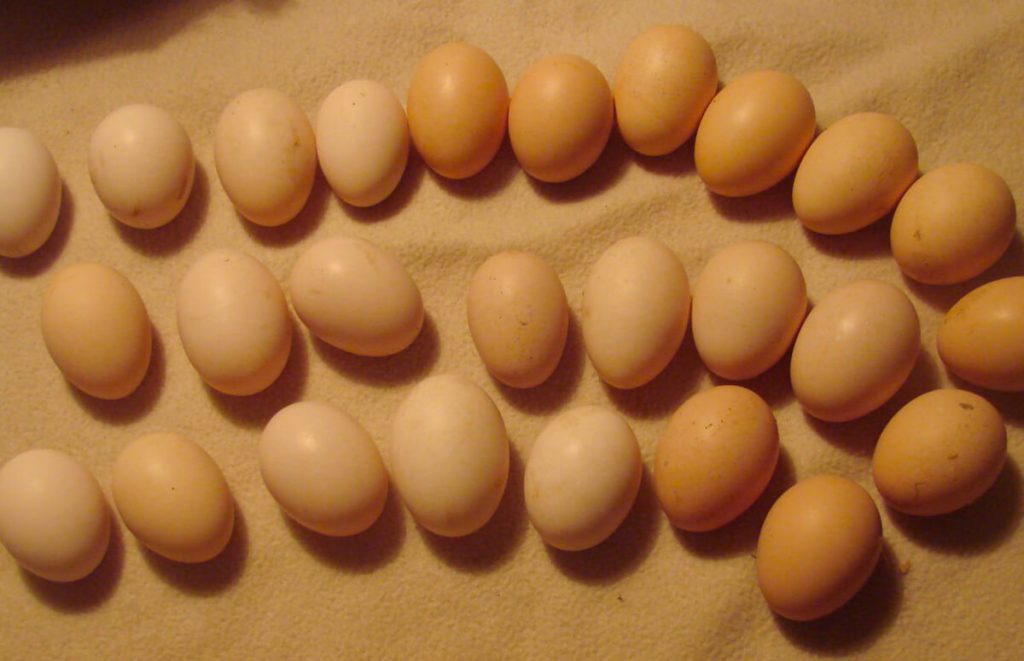
Wyandottes can display a tendency for broodiness: some hens are urged to sit on their eggs. This can be advantageous if you plan to hatch eggs, but unfortunately, a sitting hen will stop laying.
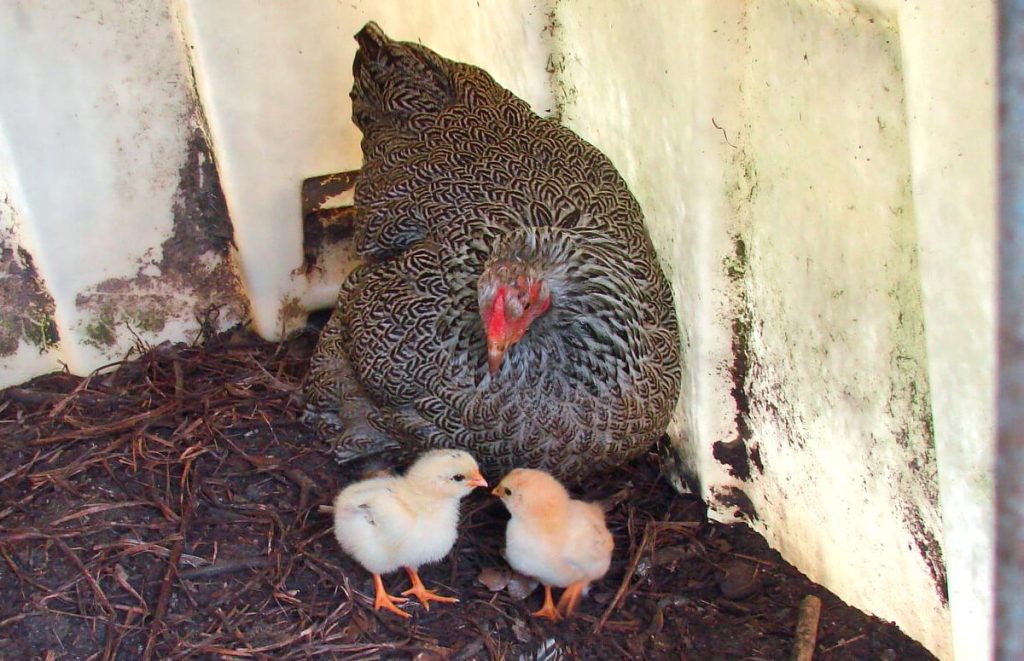
Pros and Cons of the Silver Penciled Wyandotte
Many people love the Silver Penciled Wyandotte, but like any breed, it has its perks and quirks.
First of all, Wyandotte chickens excel in cold climates. They are equipped with small rose combs and fluffy bodies, which make them remarkably self-reliant and resilient to chilly temperatures.
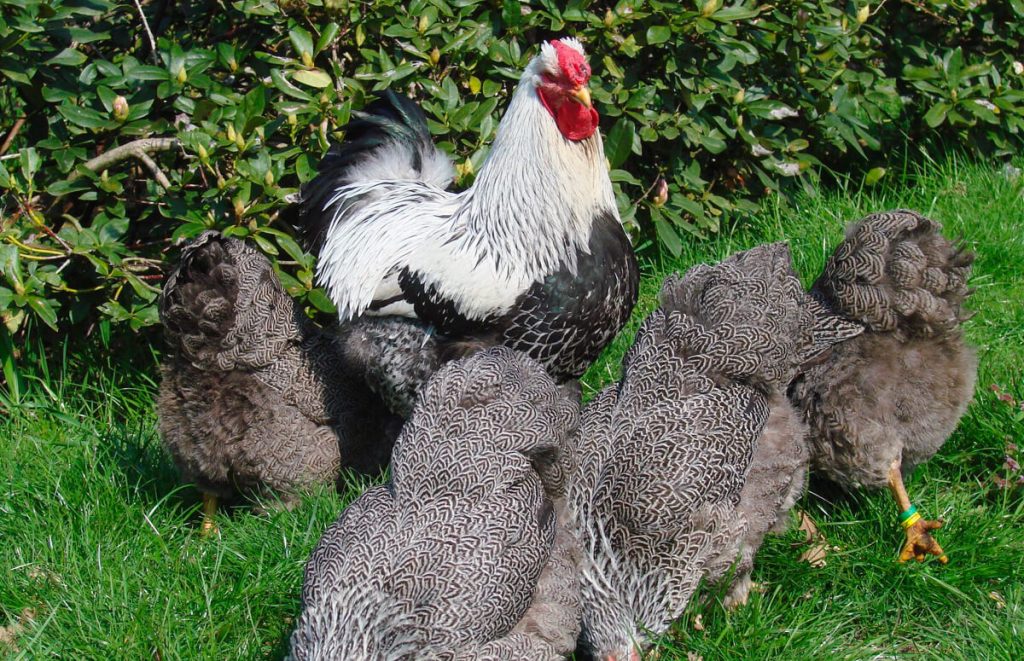
Additionally, their striking silver-white and black plumage adds an ornamental touch to any flock, making them a popular choice among poultry enthusiasts. The dual-purpose nature of this breed, known for both egg production and meat quality, enhances its practical appeal.
| Pros – Reasons to choose for Wyandottes | Cons – Reasons to go for another breed |
|---|---|
| Cold-hardy Excellent foragers Dual purpose breed Beginner-friendly Don’t need much extra care Friendly towards people | Need more space Dominant towards smaller breeds Don’t do well in warm climates Some breeds lay more eggs They are no lap chickens Tend to go broody |
However, this also means they need more space than most other breeds. Next to that, despite their cold-hardy nature, they do not fare well in warmer climates. Silver Penciled Wyandottes can also be dominant if you keep a mixed flock. It’s best not to keep them together with submissive breeds like Silkies or Faverolles.
Climate
Silver Penciled Wyandottes are known for their adaptability to various climates, making them suitable for different regions. They are very cold-hardy, as they were originally bred to withstand harsh American winters.
Their low rose combs are less susceptible to frostbite than single combs, and their dense feathering helps to keep them warm during colder winters. However, just because they are black and white doesn’t make them penguins.
On the flip side, Wyandottes aren’t too keen on tropical temperatures. During a heat wave, always keep them cool. Otherwise, they’ll quickly overheat and suffer heat stress.
Silver Penciled Wyandotte Variety
The Silver Penciled Wyandotte is one of the many color varieties of the Wyandotte. It’s a recognized variety by the American Poultry Association for Large Fowl and Bantam chickens.
The world of Wyandotte chicken colors can be complex. While The Standard of the American Poultry Association recognizes ten official varieties, the Europeans list thirty colors, including the Silver Penciled Wyandotte.
The Wyandotte chickens generally come in three classes:
- Laced Wyandottes: silver laced, gold laced, blue laced, …
- Marked Wyandottes: black-white Columbia, Partridge, Silver Penciled, …
- Single-colored Wyandottes: white, blue, black, buff, …
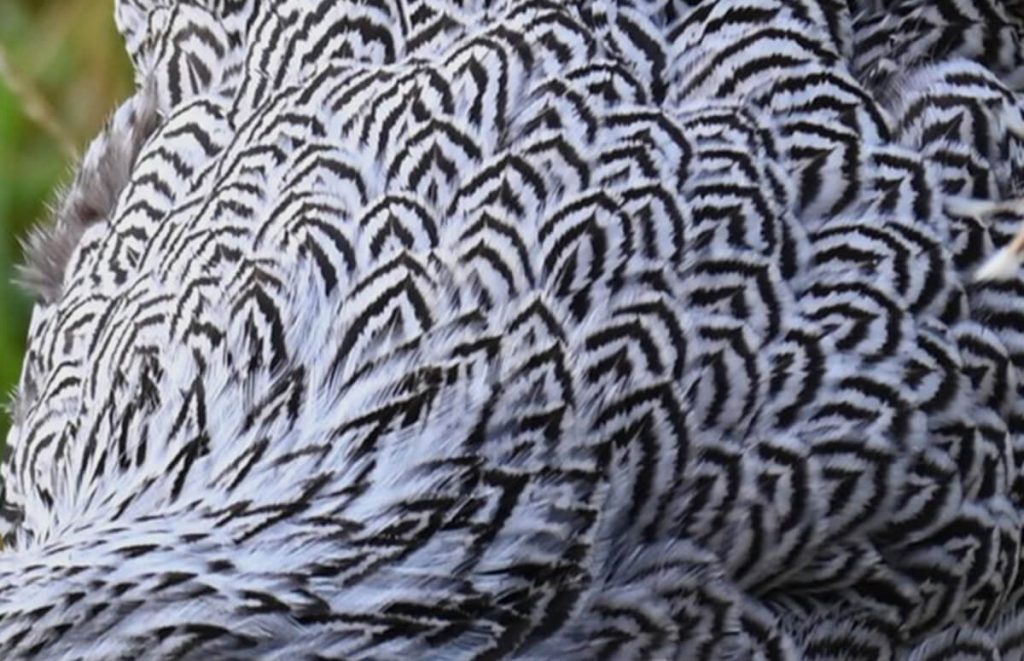
The Silver Penciled Wyandotte and the Partridge Wyandotte hens both have distinct, sharply defined black lines on their feathers. Ideally, the penciling follows the form of the feather and is even and uniformly spread.
However, in the Partridge Wyandotte, the base color is golden yellow, while the Silver Penciled Wyandotte has a white ground color.
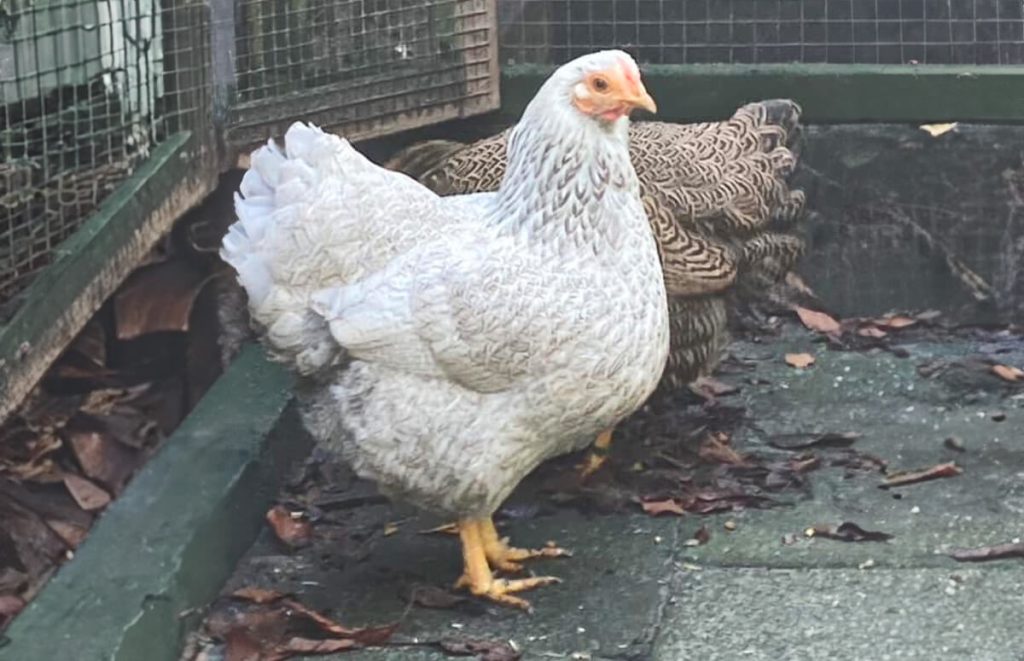
At European exhibitions, you can occasionally spot a Silver Blue Penciled Wyandotte. In these birds, the black marking is replaced by a blue, greyish color.
Silver Laced vs. Silver Penciled Wyandotte
The Silver Penciled and the Silver Laced Wyandotte are both visually striking varieties within the Wyandotte breed. The primary difference lies in the arrangement of markings on their feathers.
The Silver Laced Wyandotte is a white chicken with a wide black lacing on its feathers. Each feather has a black edge, contrasting sharply against the white background. The lacing pattern is singular, with a single black edge outlining each feather.
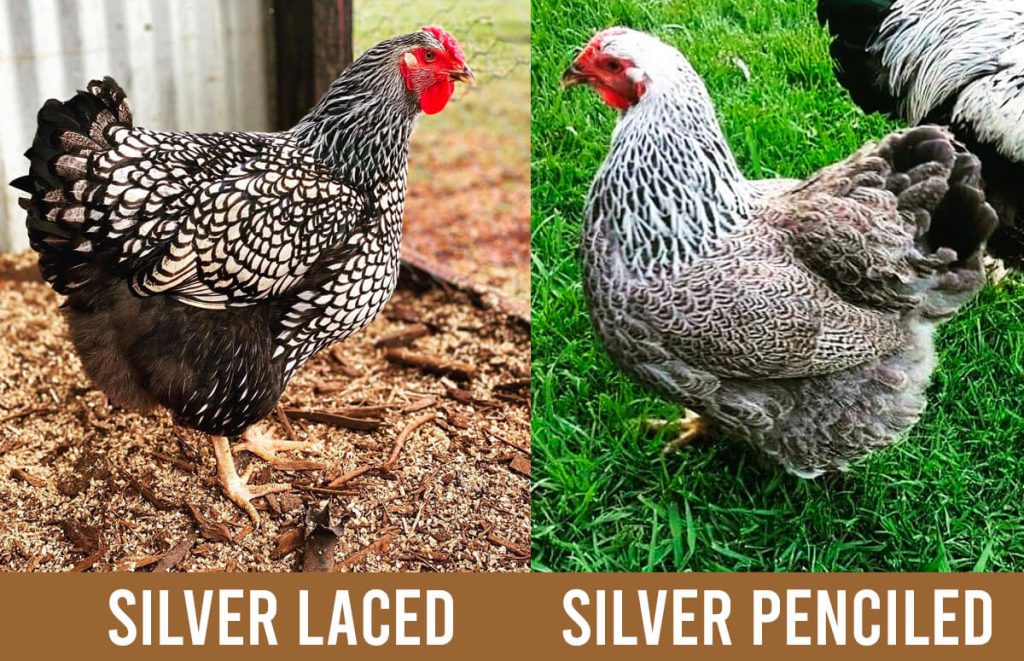
The Silver Penciled Wyandotte, on the other hand, shows a more complex feather pattern. Instead of a single lacing, this variety has multiple nested lines on each feather. The penciling consists of fine, parallel lines of black and white. The base color of the feathers is white.
In short, the key distinction is that the Silver Penciled Wyandotte has nested lines, forming a penciled pattern, which differs significantly from the single, bold lacing of the Silver Laced Wyandotte.
Penciled or Pencilled?
We’ve had some people asking about the right way to spell Penciled. The distinction between “penciled” and “pencilled” is a classic example of the subtle differences in spelling between American and British English. Both ways work, but it just depends on where you’re from.
In the United States, the preferred spelling for describing something marked with fine lines or strokes is “penciled.” In contrast, the preferred spelling in the United Kingdom and Europe is “pencilled.”
The American Poultry Association uses ‘penciled’ in their Standard of Perfection, while the Poultry Club of Great Britain uses ‘pencilled’.
History of the Silver Penciled Wyandotte
The Wyandotte chicken breed is named after the Wyandot (or Wyandotte) Native American tribe. It was developed in the US during the late 19th century. The exact origins of the Wyandotte breed are unknown, but it is generally believed to have been developed through selective breeding involving the Dark Brahma and Spangled Hamburg.
The Silver Laced Wyandotte was the first official color variation, gaining recognition in the American Standard of Perfection in 1883. It was appreciated for its dual-purpose nature, and as a utility breed, it was well-suited for both egg production and meat.
The Silver Penciled Wyandotte is one of the many color varieties that followed. Its distinct penciled feather pattern was developed in the late 19th century in the United States.
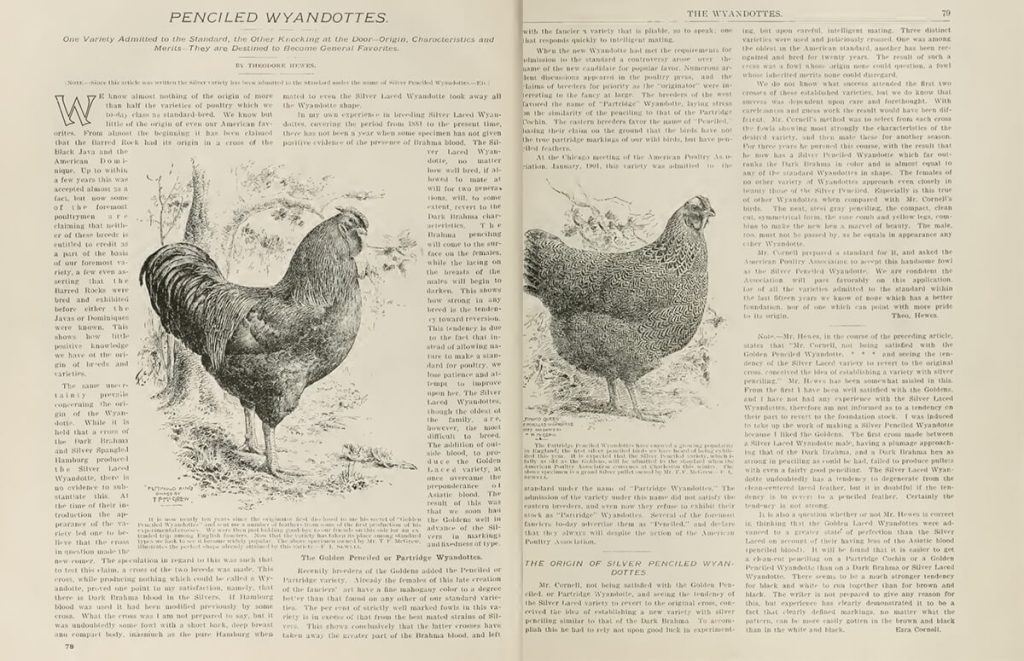
George Brackenbury and Ezra Cornell, both from New York, played a significant role in the creation of the Silver Penciled Wyandotte. They initiated a breeding program that crossed several chicken breeds, including Partridge Wyandottes, Dark Brahmas, Silver Laced Wyandottes, and Silver Penciled Hamburgs.
Ezra Cornell was particularly proud of the exquisite penciled pattern on his Silver Penciled Wyandottes. In 1897, he publicly stated that the markings on his Silver Penciled Wyandottes surpassed those of his Partridge Wyandottes. This accomplishment contributed to the breed’s recognition and popularity.
In 1902, the Silver Penciled Wyandotte variety was officially admitted to the American Standard of Perfection.
Genetics
The Silver Penciled pattern is the result of two effects:
- the silvery-white base color
- the black penciling pattern
Ground Color
The Silver Penciled Wyandotte is white because its DNA contains the Silver gene (S). This sex-linked gene is located on the Z chromosome. Roosters carry two copies of the S-gene, hens only one. So a Silver Penciled Rooster can carry some gold (suppressed by the S-gene), but a hen can’t hide gold if it’s white.
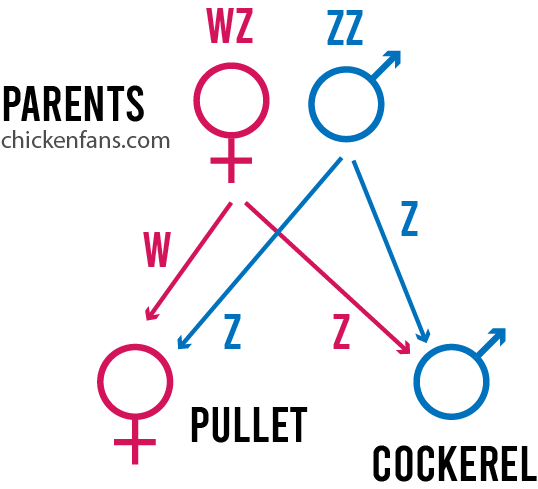
When the gold comes through (s+), you get Partridge Wyandottes. Nothing else is going on. In Wyandottes, the partridge color isn’t related to the partridge gene, which is a specific allele of the black Extension (E) gene. They’re simply the gold (s+) variant of the Silver Penciled Wyandottes.
Penciled Pattern
The black lines of the penciling pattern in Silver Penciled Wyandottes result from the “Pattern gene” (Pg). This gene arranges the black pigments in concentric lines on the feather, keeping the outer lace in its natural color.
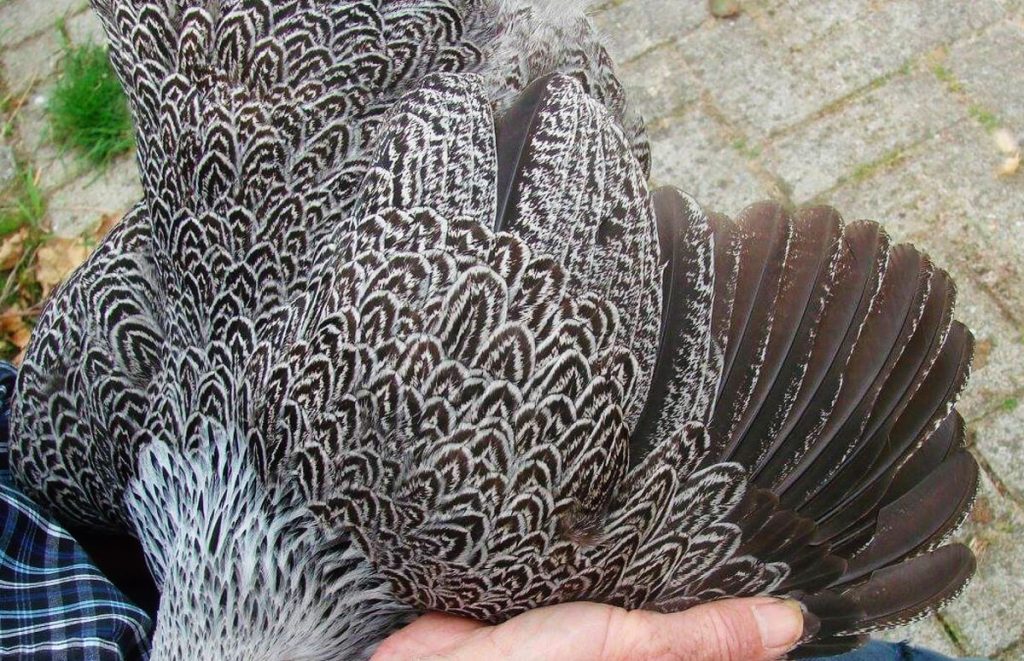
Single Laced Wyandottes also have the pattern gene (Pg), but they also have Melanotic (Ml) and Columbian (Co) genes. Ml makes the lines broader and causes them to shift toward the edge of the feather, while Co removes the inner lacing.
Breeding
The major challenge for breeders is to get the lacing nice and tight. Oftentimes, dilutions occur in the pigmentation of the pattern. Many breeding cycles may be needed to get a uniform and beautiful lacing on the inner field of the feather.
If you have Silver Penciled Wyandotte roosters that carry some invisible gold, crossings with Partridge hens can give Partridge offspring. This happens when the chicks inherit the gold from their Silver-looking father.
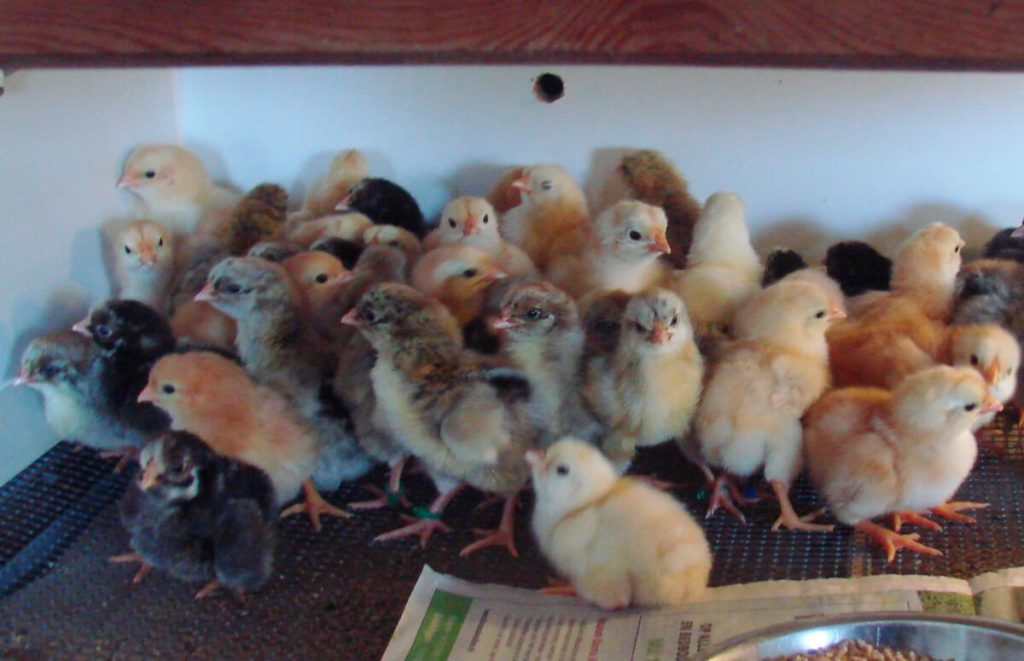
For roosters, the most common issues are too much white in the chest, sickles, or tail. Sometimes, they also have a yellow hue in the ornamental feathers.
Hens often show weak or incorrect markings in the chest feathers, wing cover, and back. It’s common to see them too rusty, leaking the gray-brown base color. Sometimes, they have peppered markings instead of a clear lacing pattern, with many small black dots on a yellow-brown background.
Personality
Silver Penciled Wyandottes, like other members of the Wyandotte breed, are known for their friendly and sociable personalities. Many chicken keepers favor them for their wonderful temperament and adaptability.
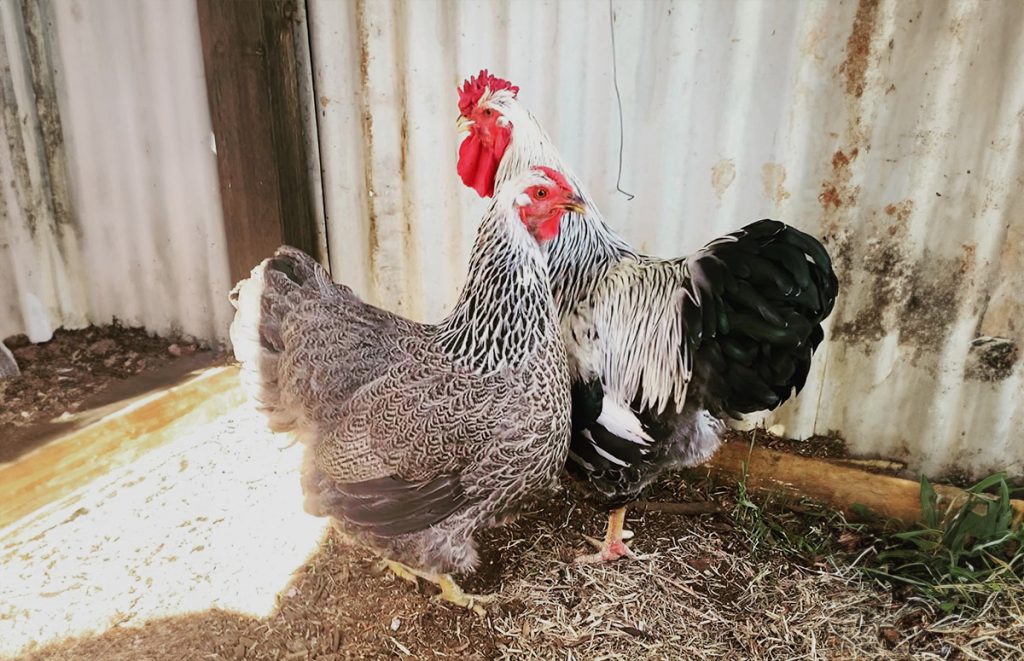
They are often described as docile and approachable, making them a good choice for families and beginning chicken keepers.
Wyandottes tend to be relatively calm and non-aggressive when interacting with other flock members, although they can be dominant. They can establish a pecking order but do so without excessive aggression.
Due to their assertive nature and slightly heavier build, Wyandottes are mostly positioned high in the pecking order.
Related Articles
Here are some of the articles we mentioned:
- Wyandotte Chickens: an overview of the Wyandotte chicken breed and the color varieties
- Silver Laced Wyandotte: a breed profile of the Silver Wyandotte variety
- Golden Laced Wyandotte: a breed profile of the Golden Laced Wyandotte variety
- Buff Wyandotte: a complete guide of the Buff Wyandotte chicken and buff varieties
- Blue Wyandotte: a complete guide of the Blue Wyandotte chicken and blue varieties
- Blue Laced Red Wyandotte: a comprehensive guide on this interesting variety
- White Wyandotte: a breed profile of the White Wyandotte
- Sebright Chickens: a chicken breed that has varieties with a similar lacing pattern
- Brahma Chickens: large chicken breed originally used to create the Wyandotte
- Hamburg Chickens: chicken breed used to create the Wyandotte
- Chicken Feather Guide: to understand the difference between all types of feathers
- Chicken Breeding & Genetics: an overview for chicken breeding and genetics for beginners
If you are considering to get Silver Laced Wyandottes, here are some other resources:
- Chicken Coop Size Calculator: to calculate the size of your coop
- Chicken Raising Guide: general chicken raising guide
Special thanks for photos and contributions go to Cactus Hill Poultry breeders and the experts at the Dutch Wyandotte Club, specializing in breeding Wyandottes.

